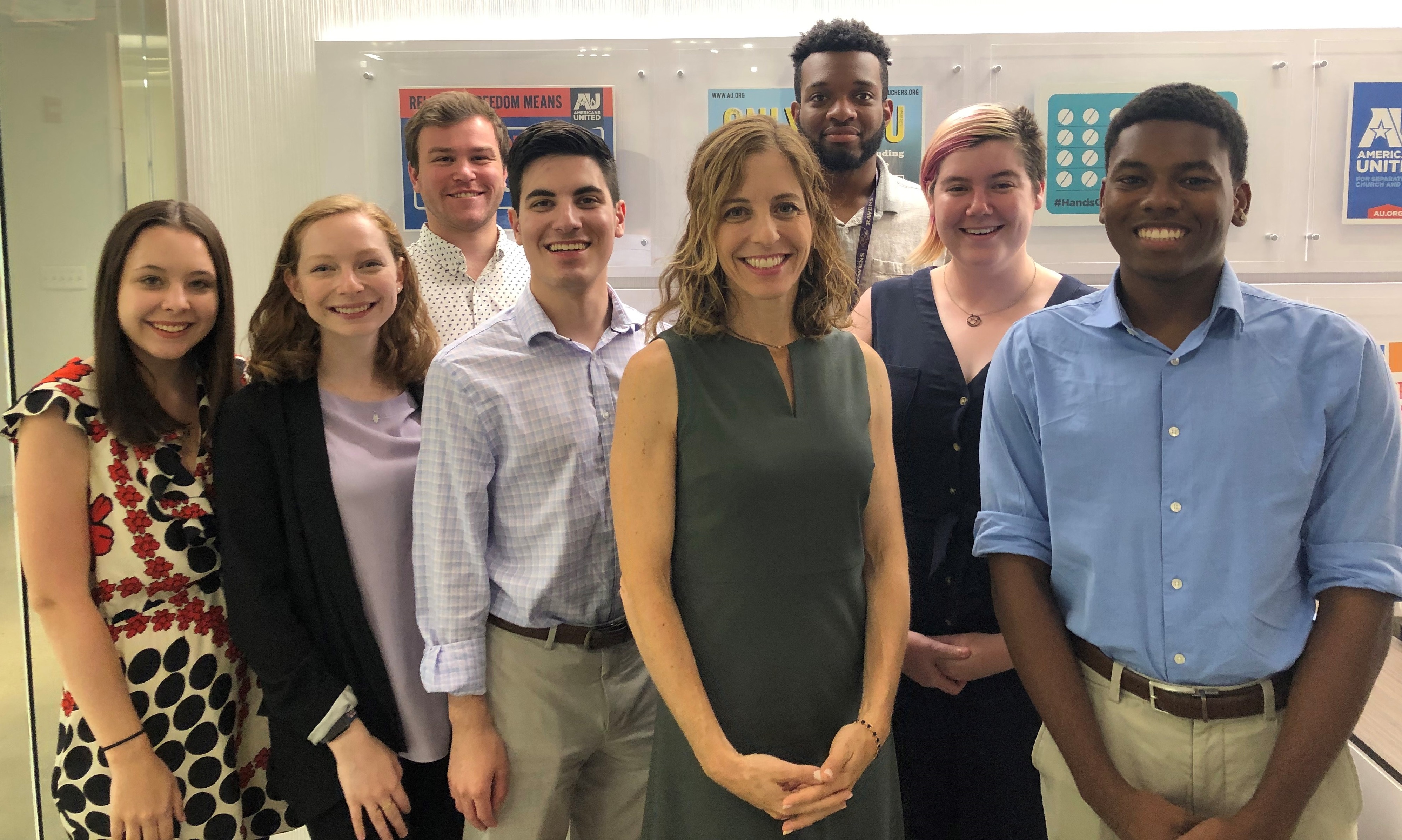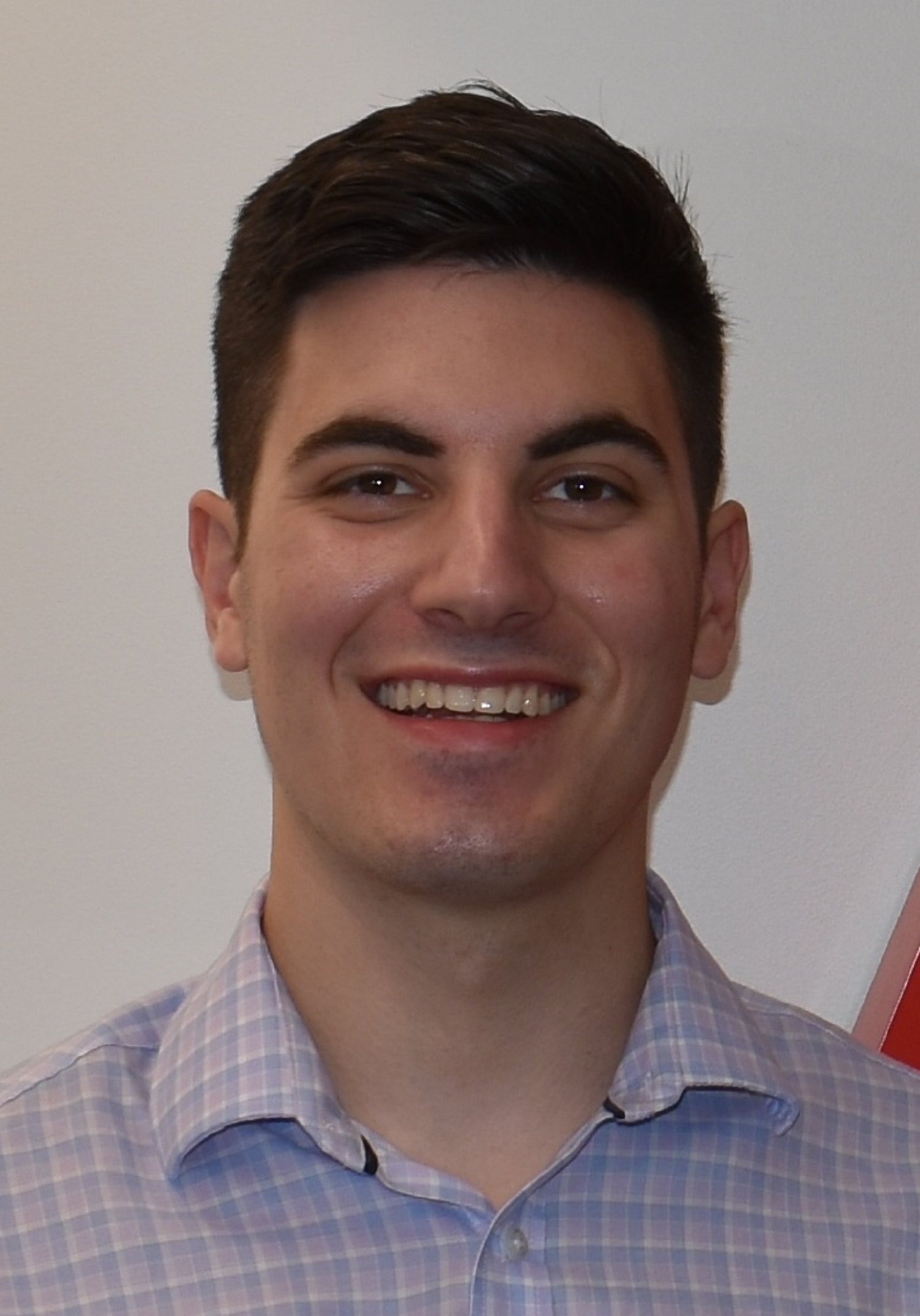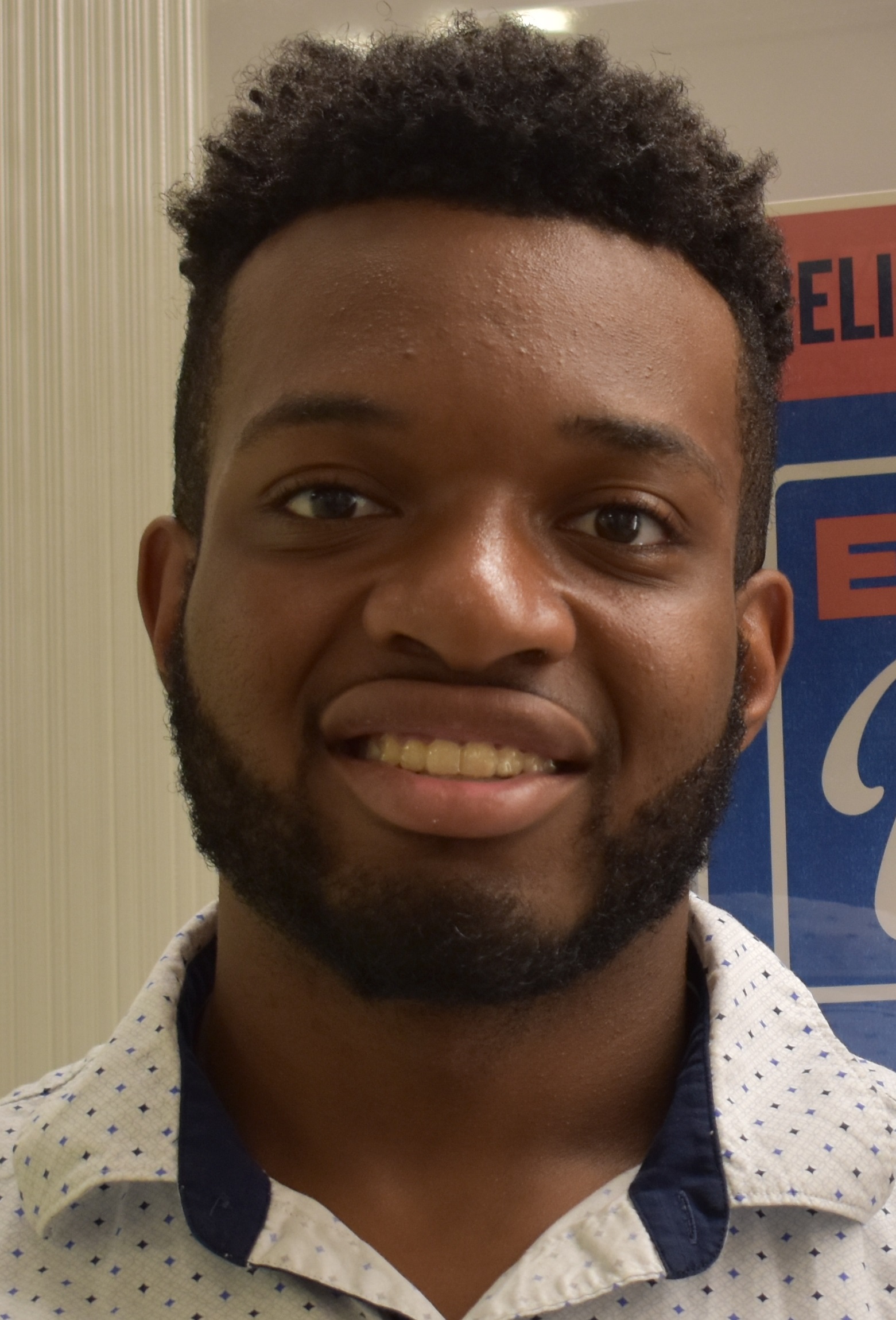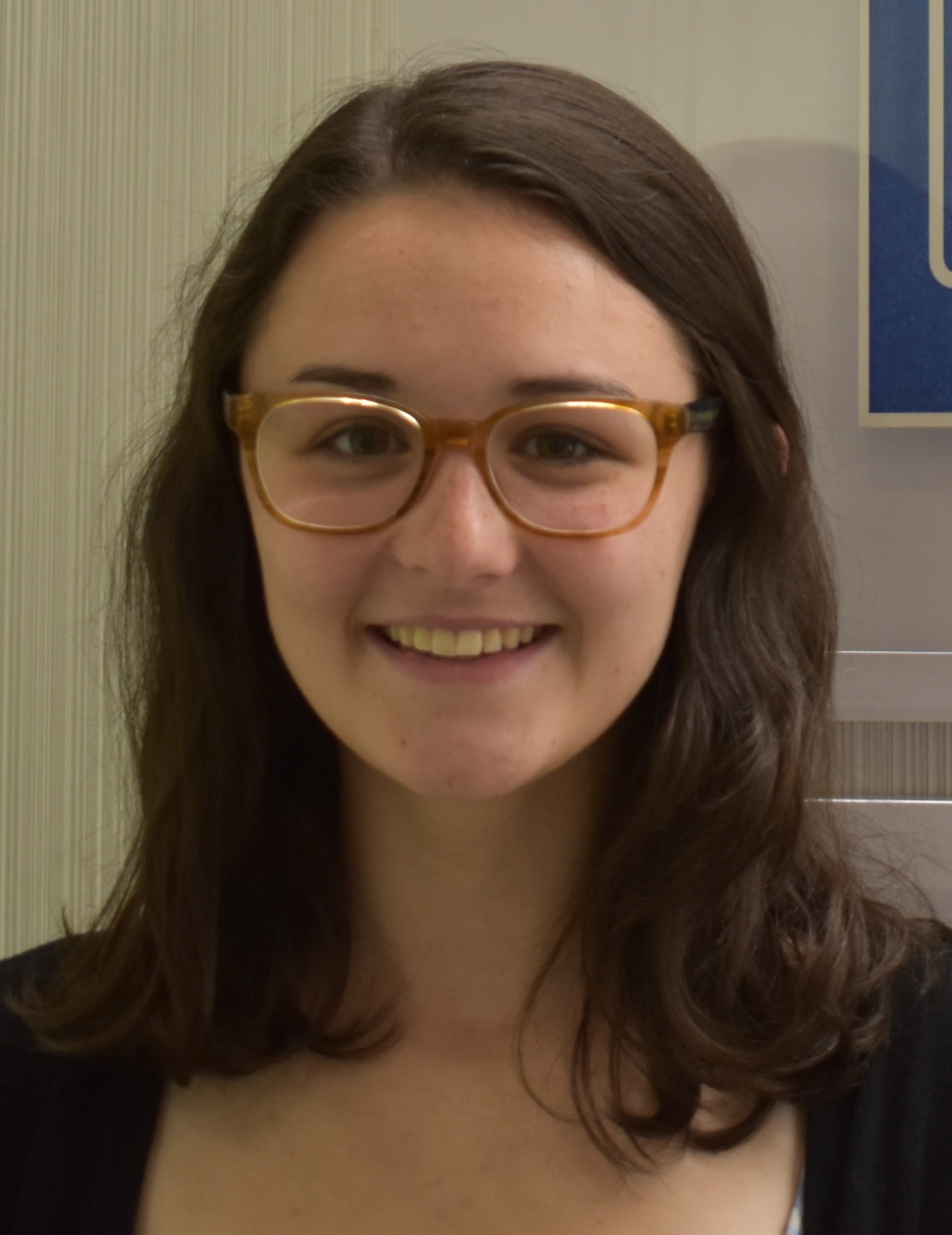Editor’s Note: Thanks largely to the machinations of the Trump administration, the separation of church and state is under attack as never before. How will the next generation of leaders respond? To answer that question, Church & State asked three young people who worked as interns at AU this summer to explain why separation of church and state is important to them. Here’s what they had to say:

(Photo: AU President and CEO Rachel Laser, center, with several AU summer interns.)
Zachary Freiman
|
When my great-grandparents fled the Russian Empire at the end of the 19th century, they were escaping poverty, war and religious persecution. Without any legal protection provided to ethno-religious minorities such as Jews, the Russian government not only encouraged their systematic targeting and abuse but mandated it by law. Arriving in America, my family was finally free of such devastating oppression – or so they thought. The open arms they may have expected morphed into “Jews Not Allowed” signs hung outside establishments across the country. Legal religious and racial discrimination was ubiquitous. Of course, Baltimore and New York City were no Czarist Russia or Nazi Germany; despite the codified discrimination, these communities were relatively safe for Jews. Yet, the dream of a country in which all people are free to practice or abstain from religion without discrimination or fear for their safety had simply not yet been achieved. Never did I think my liberty in this country would be threatened for being Jewish. In my mind, anti-Semitism and religious discrimination in the United States was relegated to the bygone era of my grandparents: 10-cent movie tickets and the Ku Klux Klan. However, the recent tectonic shift in the federal government as the result of the election of a president who parrots Christian nationalism only concretized what has been happening for years in state and local legislatures throughout the U.S. |
 |
The Religious Right has taken a sledgehammer to the wall of separation between religion and government from state to state – and now at the national level – introducing and implementing hundreds of laws and government policies favoring Christianity as well as targeting non-Christians, including members of other religious faiths and the non-religious community.
That is why I joined Americans United – to assist AU’s efforts to reinforce the separation of church and state and combat extremist policies, whether they be permission for health care workers to deny care to patients based on the workers’ religious beliefs or government funding of Christian Bible classes in public school.
As AU President and CEO Rachel Laser likes to say, religious freedom should be a shield that protects people, not a sword used to harm others. Rather than institute government support of discrimination against LGBTQ individuals, women or religious minorities, our elected leaders should be strengthening true religious freedom: the freedom to pray or not to pray to whomever or whatever one so chooses; the freedom to access health care regardless of one’s religious beliefs, sexual orientation, gender, race, etc.; and the freedom to attend public school without being subjected to religious proselytizing.
I know the value of religion. Having attended Jewish day school, I learned to explore and grapple with my own religious identity as a young person. I also know its bite – the pain and suffering that can be inflicted under the guise of government-sponsored religion.
Our country was designed as a safe haven from religious persecution, and it is our patriotic and moral duty to ensure that we commit to that ideal in its fullest capacity. And, without doubt, that ideal’s most crucial element is the absolute separation of the government from religion in all its capacities.
I look forward to defending that principle.
Zachary Freiman, a senior at Pomona College majoring in public policy analysis and music, interned in Americans United’s Communications Department.
Kenneth M’Bale
 |
When looking at political issues, many times we tend focus on ones that present a big potential shift in our country. It is easy to overlook the more mundane issues, probably because they are so ubiquitous and fundamental to everyday life. This was my mindset coming to Americans United. I am a Catholic from a family with heritage from the Democratic Republic of the Congo and Haiti. These countries and many others have complicated ties to Catholicism, and to Christianity in general, because these religions arrived as a result of European colonialism and missionaries who sought to oppress traditional beliefs and cultures. The close ties between religion and government in both nations has led to some problems. The United States, by contrast, is known around the world as a bastion for religious freedom. While we don’t always get it right, we seek the proper balance, with religion being neither too domineering, such as in countries where a certain faith permeates the laws, nor too restrictive, such as in countries where religion is actively discouraged and even persecuted. With this mindset, the way religious freedom functions in the U.S. looked good to me on the surface. But like any complex facet of society, the true nature of how religion operates in our country requires a deeper plunge. On my first day at AU, I was introduced to the case involving the Bladensburg Cross. I was very familiar with this structure. I live in the Maryland county where it’s located. I know that it has been a staple of the area for decades, and it’s something that I saw every day on my way to high school. |
To be honest, I had never thought too much about the cross, but I will admit that I did get a slight feeling of disappointment that something that formed a part of my adolescence was being targeted in court. The feeling wasn’t even related to a sadness in a loss of a Christian symbol; it was more so about nostalgia. Interestingly, a week after I started working at AU, a couple of barbers at my barbershop mentioned that the cross might be taken down and expressed similar disappointment in a community staple being targeted.
Traditions and symbols can be tricky things because they don’t mean the same thing to everyone. Catholics may be religious minorities to some extent, but they are a part of the overall Christian majority that is omnipresent in the U.S. That’s when I realized that, as a Christian, I’m viewing the cross from the perspective of the majority. Being African-American, I’m not used to being in the majority group (aside from being a man), so I had never even once considered what it felt to be a non-Christian in America outside of explicit discrimination.
It was easy for me, personally, to overlook Christianity’s presence in the country because I’m part of that majority, but that may not be the same for others. It is hard to switch through radio or TV channels without hearing something related to Christianity, and it’s hard to even traverse different buildings in a given city without seeing a cross. In fact, my home county of Prince George’s has an estimated 800 churches. It is impossible to say that this presence has no influence on non-Christians, and it is impossible to say one could raise their children absent of this influence. It must be unnerving to some non-Christians to live in a community where the government also seems to be endorsing the majority faith by displaying its symbols on public land. That would make me feel like an outsider in my own community.
After coming to AU, I saw the Bladensburg Cross in a new light. I can say I now not only understand AU’s work but the gravity of it and what is at stake. To my fellow Christians, I’d like to say, please do not take every attempt to enforce church-state separation as an attack on Christianity. It is imperative to be critical of each individual situation and weigh the circumstances surrounding it.
Yes, the cross has been a part of the community and the community’s collective memories, but we would still have those memories even if the cross had been removed. They can never be taken away. But please consider that it is a bit daunting or unsettling for non-Christians to see a 40-foot-tall cross in an area that’s not a church and is indeed public land. By all means, follow your faith – but have the courtesy to consider the feelings of others who follow a different faith and don’t see the omnipresence of Christianity in our country the same way.
Kenneth M’Bale, a senior at University of Maryland-Baltimore County majoring in media communications and political science, interned in Americans United’s Communications Department.
Ruby French
|
Raised by a nonreligious father and a culturally Jewish mother, my religious upbringing was far from traditional. My mother’s family introduced me indirectly to the world of Judaism; through sporadic Bar Mitzvah and yearly Hanukkah celebrations, I dipped my toes into the sphere of faith. When I was in third grade, I asked my mom if I could try going to Hebrew school. My freethinking parents obliged, and I began a fiercely independent journey into my own spirituality. As I got older, I became more and more involved with my local temple. At 12, I had a Bat Mitzvah, and at 13, I decided I wasn’t quite ready to leave the community I had stumbled upon. I volunteered at the religious school teaching Hebrew, Bible studies and ethics to third- and fifth-graders and remained in this position throughout high school. Growing up in a small town in upstate New York, I became the resident Jew in a sea of Christianity. Once it was time for me to leave this little town for college, I was excited about the diversity on the horizon. In high school, the phrase “Yom Kippur” was foreign to most of my friends, and I was excited to meet people of diverse cultural and religious backgrounds with whom I could connect and from whom I could learn. In my first year of college, I found the diversity of thought that I was yearning for and became a part of many new communities on campus. Although my faith has become more spiritual than religious, I hold my Jewish heritage close to my heart. It connects me to my past and reminds me of the loving community that took me in as a young girl searching so earnestly for something to which I would belong. |
 |
I am so thankful for the way my secular parents handled my childhood wishes, and I feel extraordinarily lucky that I have had the freedom to explore religion without pressure or threats of discrimination. Unlike so many who have had to fight for the ability to pray (or not pray) how they want, I was afforded this critical right at a young age. I hope that someday all Americans can experience this freedom to believe or not to believe in whatever way they choose. This is one reason among many why I chose to spend my summer at Americans United for Separation of Church and State.
Beyond my personal experience with religion, I am passionate about the intersectional space in which Americans United works. In a country where health care is increasingly politicized and religion is often used nefariously, it is more important now than ever to fight for the separation of religion and government. The rise of the Religious Right, accompanied by the Trump administration’s attacks on civil liberties, puts this idyllic balance in peril.
As a high school senior, I was mortified to watch as a reality television star stepped into one of the most influential offices in the world. As the administration has gained momentum and begun to systematically ignore the fundamental principle of separation between church and state, I have only become more afraid.
And yet I support Americans United not out of fear, but out of hope. I have hope for this country, and I intend to work tirelessly to ensure that all Americans enjoy religious freedom without the threat of discrimination. I believe in true religious freedom, and for that to exist, it must not be used to harm others, only to protect oneself.
I support AU because I believe in reproductive justice, a public school system free from religious indoctrination and the end of discrimination against LGBTQ people under the guise of “religious freedom.” I stand with AU because I care about creating a more equal and just society for all Americans. And you should, too.
Ruby French, a junior at Cornell University majoring in government and anthropology, interned in Americans United’s Legal Department.


